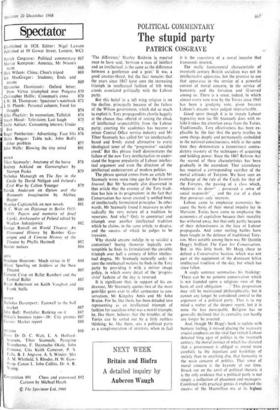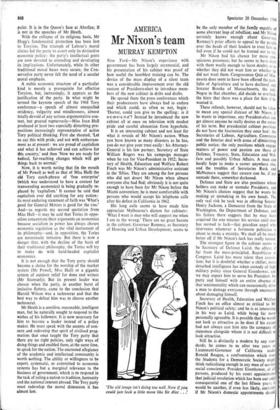The stupid party
POLITICAL COMMENTARY PATRICK COSGRAVE
'The difference,' Stanley Baldwin is reputed once to have said, 'between a man of intellect and an intellectual, is the same as the difference between a gentleman and a gent.' It was a good counter-thrust, but the fact remains that the years since 1867 have seen the increasing triumph in intellectual fashion of left wing creeds associated politically with the Labour party.
But this belief in a left wing religion is on the decline, principally because of the failure of the Wilson government, which did so much to exploit it. Tory propagandists chortle happily at the chance thus offered of seizing the cloak of intellectual respectability from the Labour party; courting the academics has become a minor Central Office service industry and Mr Tibor Szamuely has called for 'an intellectually based and firmly stated alternative to every ideological tenet of the "progressive" socialist creed.' But this phrase itself demonstrates the failure of the new Tory intellectualists to under- stand the bygone popularity of Labour intellec- tual argument and even the direction of the intellectual undercurrent of modern politics.
The phrase quoted comes from an article Mr Szamuely wrote some time ago for the Swinton Journal. But Mr Szamuely also discovered in that article that the essence of the Tory tradi- tion has lain in its pragmatism; in the fact that Conservatism has never created 'a unified body of intellectually formulated principles.' In other words, Mr Szamuely found it necessary to alter radically the very nature of a tradition he venerates. And why? Only to counteract and triumph over another intellectual tradition which he claims, in the same article, to despise, and the success of which he judges to be transient.
Why should anyone indulge in so suicidal a contortion? Seeing (however logically con- temptible he finds its formulation) the enviable triumph over half a century of leftist intellec- tual dogma, Mr Szamuely naturally seeks to cure the intellectual malaise he finds in the Tory party by providing it with a mirror image policy, in which every detail of the 'progres- sivist' fashion of the day is reversed.
It is significant that, in support of his en- deavour, Mr Szamuely quotes two of the most gent-like gents ever to offer sustenance to con- servatism, Mr Kingsley Amis and Mr Johri Braine. For he, like them, has been deluded into representing as an intellectual triumph of fashion for socialism what was a moral triumph; he, like them, believes that the troubles of the Tories can be sorted out by a little ruthless thinking; he, like them, sees a political party as a conglomeration of interests, when in fact it is the repository of a moral impulse that transcends interest.
The really fundamental characteristic of twentieth century British socialism was not its
intellectualist apparatus, but the promise to use that apparatus in the service of a powerful current of moral concern, in the service of humanity and the forsaken and ill-served among us. There is a sense, indeed, in which almost every vote won by the Tories since 1945 has been a grudging vote, given because Labour's dreams were judged impracticable.
Good sport though it is to impale Labour hypocrisy now (as Mr Szamuely does with re- lish) it takes the attention away from the Tories.
Traditionally, Tory effectiveness has been ex- plicable by the fact that the party testifies to
some things deeply and permanently embedded in the national consciousness, while at the same time they demonstrate a (sometimes) contra- dictory mastery of the techniques of acquiring and holding power. Since the 1867 Reform Act the second of these characteristics has been gradually in the ascendant. That ascendancy has required a corresponding sacrifice of the moral attitudes of Toryism. We have seen an exchange of the rule of the Cecils for that of the Forsytes, the passing of a class which.
whatever its dem."' , possessed a sense of social responsibv" ,, and the rise of a class that possesses only interests.
Labour came to emphasise economics be- cause the basis of their moral impulse lay in Marxism. Tories have come to emphasise the economics of capitalism because their morality has withered away, but that only partly because of their defensiveness in the face of Labour propaganda. And some sterling battles have been fought in the defence of traditional Tory- ism. Most notable among them was Mr Quintin
Hogg's brilliant The Case for Conservatism. But, in this little book, Mr Hogg chose to
defend a Conservative bastion, which was not part of the equipment of the dominant leftist intellectual tradition of the day, but which has since fallen.
A single sentence summarises his thinking: 'There can be no genuine conservatism which is not founded upon a religious view of the basis of civil obligation . . .' This proposition may still be maintained philosophically, but it cannot any longer be considered central to the
argument of a political party. That is to my mind a matter of the deepest regret, but it is none the less inescapable. Religion has so generally declined that its centrality can hardly any longer be asserted.
And, though Mr Hogg's book is replete with humane feeling, it missed placing the necessary crucial emphasis on the vital fact (which Labour detected long ago) of politics in the twentieth century, the moral instinct of which has dictated that a government is obliged to attend more carefully to the injustices and hardships of society than to anything else, that humanity is the main concern of politics. That sense of moral concern is the keynote of our time. Struck out on the anvil of political rhetoric it
is the only evidence that a political party is not simply a collection of placemen and managers. Combined with practical genius it explained the success of the Macmillian era at its highest point. It is in the Queen's face at Aberfan; it is not in the speeches of Mr Heath.
With the collapse of its religious basis, Mr Hogg's fundamental protection has been lost to Toryism. The triumph of Labour's moral claims led the party to assert only its distinctive economic policy: the party's intellectual gents are now devoted to extending and developing its implications. Unfortunately, while its other traditional moral bases were secure, the Con- servative party never felt the need of a secular moral emphasis.
A stable economic structure of a particular kind is merely a prerequisite for effective Toryism, but, increasingly, it appears as the justification of the party. In what might be termed the keynote speech of the 1968 Tory conference—a speech of almost unequalled stridency, vulgarity and mindlessness, almost totally devoid of any serious argumentative con- tent, but greeted rapturously—Miss Joan Hall produced at least two especially disturbing pro- positions increasingly representative of active Tory political thinking. First she shouted, 'Let us say this with pride, and not with embarrass- ment as at present: we are proud of capitalism and what it has achieved and can achieve for this country,' and then 'Now we are ready for radical, far-reaching changes which will get things back to normal.'
Now, it is worth noting that (in the mouth of Mr Powell as well as that of Miss Hall) the old Tory catch-phrase of 'free enterprise' (which was understood to have a content far transcending economics) is being gradually re- placed by 'capitalism.' It cannot be said that capitalism ever did anything for any nation : its most enduring statement of faith was 'What's good for General Motors is good for the USA.' And—as regards my second quotation from Miss Hall—it may be said that Tories in oppo- sition concentrate their arguments on economics because socialism in power has always chosen economic regulation as the vital instrument of its philosophy—and, in opposition, the Tories are notoriously imitative. But there is now a danger that, with the decline of the basis of their traditional philosophy, the Tories will try to make do with hard-headed capitalist economics.
It is not enough that the Tory party should become a shrine for the worship of the market system (Mr Powell, Miss Hall) or a gigantic system of outdoor relief for dons and writers (Mr Szamuely). But its present leader was chosen when the party, in another burst of imitative flattery, came to the conclusion that Harold Wilson was a technocrat and that the best way to defeat him was to choose another technocrat.
Mr Heath is a sensitive, reasonable, intelligent man, but he naturally sought to respond to the wishes of his followers. It is now necessary for him to become a leader instead of a policy maker. He must speak with the accents of con- cern and redevelop that spirit of civilised prag- matism that once taught the Tory party that there are no right policies, only right ways of doing things and enabled them, at the same time, to speak for the nation. The encrusted allegiance of the academic and intellectual community is worth nothing. The ability or willingness to be expert, systematic, or committed to economic systems has but a marginal relevance to the business of government, which is to respond in the task of ruling a nation to tradition, humanity and the national interest abroad. The Tory party must redevelop the moral dimension it has almost lost.



































 Previous page
Previous page